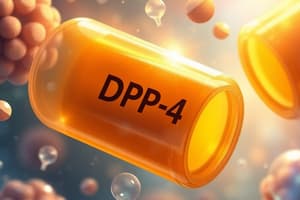Podcast
Questions and Answers
What is the full name of DPP4?
What is the full name of DPP4?
Dipeptidyl peptidase 4
What is DPP4 primarily known for?
What is DPP4 primarily known for?
- Increasing blood sugar levels
- Inhibiting protein degradation
- Causing inflammatory diseases
- Being a T cell surface marker (correct)
DPP4 is exclusively found in T cells.
DPP4 is exclusively found in T cells.
False (B)
What type of diabetes are DPP4 inhibitors used to treat?
What type of diabetes are DPP4 inhibitors used to treat?
DPP4 inhibitors may have potential modulatory functions in the ______ system.
DPP4 inhibitors may have potential modulatory functions in the ______ system.
Which immune cells express DPP4/CD26?
Which immune cells express DPP4/CD26?
What are DPP4 inhibitors primarily used for?
What are DPP4 inhibitors primarily used for?
What aspects of immune function do DPP4 inhibitors potentially regulate?
What aspects of immune function do DPP4 inhibitors potentially regulate?
Flashcards are hidden until you start studying
Study Notes
Dipeptidyl Peptidase 4 Inhibitors (DPP4is)
- DPP4 inhibitors are oral medications primarily used for managing type 2 diabetes mellitus (T2DM).
- They function by inhibiting the degradation of incretin peptides, which play a crucial role in glucose homeostasis.
- Research into DPP4is mainly concentrates on their glucose-lowering effects; however, their immune-modulating functions are less explored.
Dipeptidyl Peptidase 4 (DPP4) Characteristics
- DPP4, also known as cluster of differentiation 26 (CD26), is a transmembrane glycoprotein.
- The molecule has a mass of 220–240 kDa, featuring a short intracellular domain, a transmembrane region, and an extracellular domain.
- It has dipeptidyl peptidase activity, cleaving N-terminal dipeptides from specific peptides containing proline, alanine, or serine.
Expression and Role in the Immune System
- DPP4 is expressed in various immune cells, including:
- CD4(+) and CD8(+) T cells
- B cells
- Natural Killer (NK) cells
- Dendritic cells
- Macrophages
- DPP4 regulates the functions of these immune cells and influences several cytokines, chemokines, and peptide hormones.
Implications for Immune and Inflammatory Diseases
- Due to its involvement in immune regulation, DPP4/CD26 is speculated to play a role in various immune and inflammatory diseases.
- DPP4 inhibitors may represent a promising drug class for treating such diseases, alongside their diabetes management applications.
Requirements for Future Research
- Further clinical studies are necessary to assess the efficacy and safety of DPP4is for diabetic patients, especially those with concurrent immune diseases.
- Understanding the mechanisms behind DPP4is' effects on immune functions may pave the way for new therapeutic strategies.
Studying That Suits You
Use AI to generate personalized quizzes and flashcards to suit your learning preferences.




